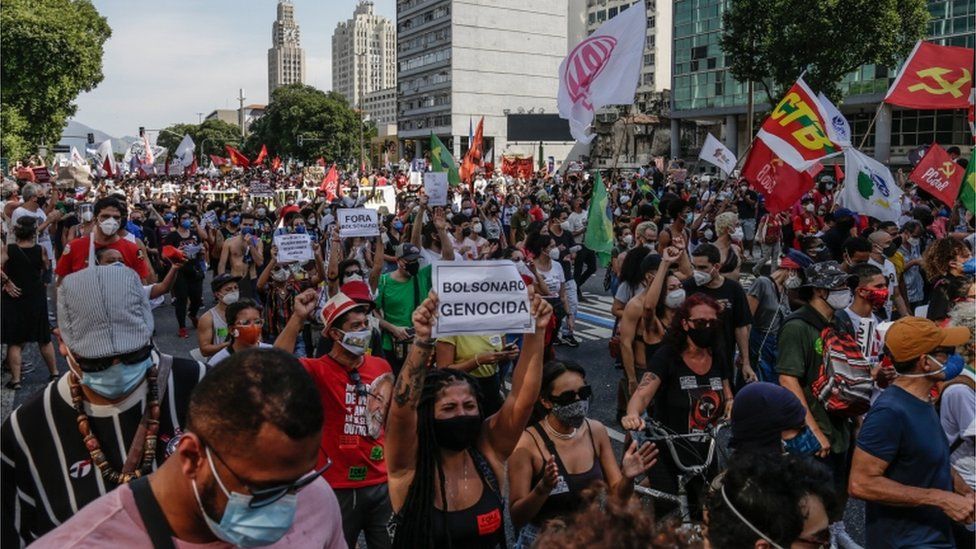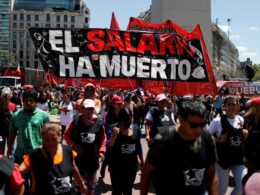Editorial of Ofensiva, newspaper of LSR, our sister organisation in Brazil
Bolsonaro was finally defeated at the polls on 30 October. After so much suffering and backlash in recent years, this result represents a significant victory for workers and youth, for women, black people, the LGBTQ+ population, indigenous peoples and all oppressed groups.
His defeat is the result of the broad rejection of his government, with its criminal management of the pandemic and an economic policy of hunger and misery. It represents a refusal by the majority of Brazilian society to his anti-popular, reactionary and authoritarian political project.
Still, Bolsonarismo is not dead and buried and cannot be belittled as a persistent threat. Defeating him definitively is still a task to be completed.
The working class and the poor and oppressed people of Brazil now have better conditions to advance in this strategic struggle against the extreme right. This opportunity cannot be squandered at the risk of this evil returning with even more force in the future.
The fundamental condition for this is not to underestimate the enemy and to trust only in the ability of our own class to organise and fight. To cut the evil by the root, we must confront Bolsonarismo by also fighting the system that created him and learning from the limits and mistakes of the hegemonic left.
A narrow victory
Bolsonaro’s defeat came despite his candidacy having promoted one of the dirtiest electoral campaigns in the country’s history. The far right used all kinds of illicit resources, the indiscriminate use of the state machine and openly buying votes.
They promoted the massive dissemination of ‘fake news’ and a true ideological, religious fundamentalist and anti-left ideological “terrorism”, using a vast network of right-wing evangelical preachers and other scurrilous means.
We also saw a broad campaign of harassment by employers towards workers in workplaces and the growth of political violence, resulting in intimidation, assaults and murders in the election period.
Bolsonaro’s campaign maintained an anti-systemic and coup profile, mobilising his most radical far-right base, while sustaining the corrupt deals made with the “Centrão”, a heterogenous bloc of right-wing and conservative politicians and parties who prioritise corruption and gaining privileges and above strict ideological positions, and have major weight in the Brazilian parliament. Even while questioning the electoral system, he went to great lengths to win the election.
They bet, on the one hand, on anti-PT sentiment and the rejection of Lula by a substantial portion of the middle classes, mainly in the south and southeast regions of the country. To reinforce this, they cynically emphasised the issue of corruption in the PT governments, reconciling with former judge and former minister Sergio Moro (elected senator for Paraná) and regaining the support of the social base of “Lavajatismo”.
On the other hand, Bolsonaro bet on short-term electoral social policies, such as the increase of the “Brazil Aid” to 600 reals (the continuity of which was not even foreseen in the budget proposal for 2023) that he adopted to try to mitigate against the huge disapproval among the poorest sectors of the population.
He also took advantage of the temporary and artificial attenuation of some of the worst effects of the economic crisis (which are now returning with full force), such as the increase in food and fuel prices and unemployment.
Bolsonaro left the race in the first round on 2 October, obtaining many more votes than the polls indicated and showing relative strength. In addition, he achieved good results in legislative elections and in state governments.
Former ministers and Vice President Mourão were elected to the Senate. Allies of Bolsonarism were elected to the government of central states such as Rio (Cláudio Castro) and Minas Gerais (Zema), as well as São Paulo, where Tarcísio de Freitas surprised by coming first place in the first round and ended up winning in the second round. The PL (Liberal Party), which embraced Bolsonaro and most of Bolsonarism, also became the largest party in the Chamber of Deputies, with 99 federal deputies.
From the first to the second round, Bolsonaro managed to increase his vote by more than seven million votes, while Lula obtained an increase of just over three million. The difference favouring Lula over Bolsonaro fell from 6 million votes in the first round to just over 2 million, representing only 1.8% of the valid votes.
Lula’s victory was unquestionable and legitimate, but the strength shown by Bolsonaro needs to be taken into account in the continuing struggle against him.
Mistakes of Lula’s campaign
Much of the electoral strength demonstrated by Bolsonaro was based on the limits and mistakes made by the PT and its allies.
From the beginning, Lula’s campaign invested in building a broad alliance that involved everything from the PSOL, on the left, to sectors of the neoliberal right, symbolised by the figure of Geraldo Alckmin as vice-presidential candidate.
They thought that in this way they could win in the first round and bet all their chips on the ‘useful vote’ for Lula, adopting a catastrophist rhetoric if this failed to happen.
As the final victory did not come on October 2, this campaign line served to create disorientation and even a certain panic in Lula’s ranks at the beginning of the second round campaign.
The result of the first round made it clear that the alliance with the right did not bring more votes for Lula. Its aim was primarily to please the big capitalists.
As Leon Trotsky explained in the 1930s, referring to alliances between workers’ parties and bourgeois parties in the so-called ‘Popular Front’, the advocates of this policy cannot reason beyond the first rule of arithmetic, addition. The simple sum of parties does not guarantee a majority in an acute context of class struggle.
What they do not understand is that political moderation, programmatic downgrading, fear of militant action and working-class struggle, inevitable consequences of the alliance with the bourgeoisie and sectors of the right, only hinder the performance of the left. This is even more valid in the case of our clash with Bolsonarismo, which does maintain an anti-systemic character, although reactionary in nature.
Instead of forcefully raising the banners of workers’ struggle (such as the defence of the repeal of the labour and social security counter-reforms) or the demands of the women’s movement (such as the defence of reproductive rights) Lula’s campaign went in the opposite direction.
In the name of the alliance with big capital, they ended up limiting themselves to defending negotiation with the bosses on labour rights. In the second round, they adhered to a conservative campaign line, where the candidate not only explicitly denied the defence of abortion rights, but also accused the opponent of not being sufficiently Christian and “god-fearing”.
The scenario in the second round campaign only changed when the real risk of Bolsonaro’s victory made broad sectors of the left and social movements move more effectively, despite the disorientation of their leadership. Even then, the political line of Lula’s campaign almost put everything at risk.
Strengths and weaknesses of Bolsonarismo
The election result and the post-election context, with the mobilisation of radical Bolsonarismo blocking highways and demonstrating in front of army barracks in many states, indicate that the struggle against the far-right, anti-popular, racist, misogynist, violent, coup and authoritarian Bolsonarist threat will not end any time soon.
The far-right mobilisations questioning the election result began with more than 600 points of roadblocks right after the second round. They were fuelled by businessmen’s money and all sorts of fanciful narratives typical of the far right.
Faced with the loss of strength of the blockades, the far-right movement prioritised sit-ins in front of army barracks in several states, some of them relatively expressive, demanding “federal intervention”, a euphemism for military intervention and coup d’état.
The movement even announced an attempt at a “general strike” (in reality an attempt at a lockout by the employers) without much success. These actions went relatively unheeded as there was no immediate and active backing from the armed forces and the most important sectors of big capital.
Faced with the immediate impossibility of a coup d’état, the intention of the semi-cult leaders of these actions (Bolsonaro himself and his far-right circle) was mainly to demonstrate strength in order to stay alive politically and to press against the prospect of being tried and convicted for the numerous crimes committed once they left government.
Together with its power of mobilisation in the streets, the weight that Bolsonarism will have in state governments and the National Congress represents a real threat to the Brazilian people and a stone in the shoe of the future PT government.
Even so, it is important to consider the situation in the context of the defeat that Bolsonaro suffered at the polls. Without the government machine in his hands, Bolsonarismo loses strength and his project of authoritarian escalation within the state has been halted, at least for now.
Many of the opportunist politicians who surfed on the Bolsonaro wave, the members of the “Centrão”, for example, may well sell their pass to Lula’s new government in exchange for benefits and advantages, as they have always done.
Moreover, without Bolsonaro in the presidency, even first-time Bolsonaristas, such as the new governor of São Paulo, Tarcísio de Freitas, tend to be more pragmatic in their relationship with the federal government.
This in no way means that Bolsonarism and the far right will cease to represent a danger. Sectors that today demonstrate a more pragmatic position may well radicalise their position in a more polarised scenario when the ‘honeymoon’ of the PT government comes to an end.
The fundamental question that arises is how to take advantage of this moment of defeat of our enemies and prevent Bolsonarism from regaining its full force and endangering democratic rights and the interests of the working class and the majority of the Brazilian people.
Trust in the Institutions or the strength of the working class?
The anti-democratic acts after the second round demonstrate that the far right, although a minority, has a significant capacity for mobilisation and is capable of causing many problems today and in the future.
Bolsonarismo will continue to be a central element in the Brazilian political landscape and could regain its strength by taking advantage of a crisis situation and the mistakes and limits of the PT and allies in government.
Our response to this threat cannot be to rely on the institutions of the political system, renouncing the mass mobilisation of workers, youth and the oppressed.
It was this same political system that legitimised the institutional coup of 2016, that led to Lula’s arrest in 2018 and that paved the way for the rise of Bolsonarismo.
It is these same institutions that proved incapable of containing Bolsonaro during his genocidal management of the pandemic, despite the denunciations of the Senate covid inquiry commission and more than a hundred requests for impeachment in the House.
These institutions also proved timid in the face of Bolsonaro’s electoral crimes. Police forces even acted as electoral accomplices of Bolsonaro, as in the case of the PRF, the federal highway police. In the future they may well turn against the workers’ movement and the left.
What was missing from the left and leaders of social movements in all these instances was a firm belief in the willingness of workers to fight for their demands, their rights and against the Bolsonarist threat.
In 2015 and 2016, the mobilisation against the coup was sabotaged by the harsh fiscal adjustment and neoliberal economic policy promoted by Dilma and her minister Joaquim Levy.
In 2017, the powerful general strike against the illegitimate government of Temer was not continued. The PT and CUT leaderships preferred to bet all their chips on stabilising the situation and on the 2018 electoral process. The result we already know: Lula was arrested and Bolsonaro won the elections
The movement for ‘Fora Bolsonaro’ exploded on the streets from 2020, despite the pandemic and the contradictory position of the leaderships of the mass movement and the PT. Once again, the struggle in the streets was not a priority for these sectors and they almost put everything at risk.
In the face of the coup mobilisations after Lula’s electoral victory, a large part of the leaderships of the trade unions and popular organisations and the PT, with some exceptions, continued with the policy of not calling for mobilisations and trusting the institutions.
Some sectors of the PT itself openly defend a great agreement, a kind of amnesty for the crimes of Bolsonarismo, as a way to pacify the country and resume institutional normality. This is the right path to new defeats.
Impunity is the route for them to commit new crimes again in the future. Bolsonaro, his accomplices in government and the businessmen who support his coup movement need to pay for the crimes they have committed against the Brazilian people.
The real path to defeat the Bolsonaro threat is the mobilisation of the oppressed and the workers based on a programme of radical transformations to benefit the majority of the population, together with conscious work on rank and file organisation and mobilisation.
Lula’s Government and the transition — the same mistakes
The process of transition to the new Lula government has made it clear that the PT has not learned from past mistakes. Bolsonaro left a disastrous legacy in his government, reflected, for example, in the budget proposal for 2023, which does not include resources for Auxílio Brasil (the national social welfare programme), school lunches and public education in general, a real increase in the minimum wage and other social policies.
Instead of seizing the authority of their victory by using the mobilisation of workers to bury the ‘spending cap’ once and for all in Congress, Lula and the PT prefer to negotiate with the ’Centrão’ a constitutional amendment that only allows exceptions to this nefarious constitutional provision.
In the same way, an attempt is underway to renegotiate the new Lula government with the “Centrão” and other right-wing sectors that were not part of Lula’s electoral coalition, such as Gilberto Kassab’s Social Democatic Party (PSD), which supported Tarcísio’s candidacy in São Paulo, or União Brasil, a merger of the Democrats (DEM) and the Social Liberal Party (PSL) — Bolsonaro’s former party.
There are even those who go as far as to defend an agreement to keep Bolsonaro’s Arthur Lira as the President of the House of Deputies under the guise of non-intervention by the Executive in the election of the chamber’s governing board.
It is true that the future Lula government does not have a left-wing majority in the National Congress. But the response to this situation cannot be a mere repetition of the methods used in previous PT governments — the give and take with Congress and the refusal to adopt policies of radical transformation.
The role of the neoliberal right within Lula’s electoral coalition and of new sectors of the right that are now approaching the new government is to put increasing pressure on Lula to abandon any vestige of policies of genuine change.
Let us have no illusions, this neo-liberal right in government does not help the governability and pacification of the country. If their policy is in place, what awaits us is more crisis and social chaos. In this context, we will see a space for the recovery of Bolsonarismo as a right-wing opposition.
This becomes even more evident if we take into account that the economic, political and social conditions for a new PT government will be much more difficult than they were from 2003 to 2016 and the room for manoeuvre will be much smaller.
The spectre of a new world recession, including the Chinese slowdown that will affect Brazilian exports, the deepening of the new “cold war” between the US and China, the turbulence and instability of the new international order, will all directly affect Brazil. Add to this an internal scenario of economic and social crisis, political polarisation and permanent conflict, with a far-right rooted in society.
The old practice and rhetoric about class conciliation and national reconciliation used in the past will have much less effect this time.
The role of the socialist left and social movements
In this situation, the role of the socialist left and combative social movements is not to give up on the struggle for popular organisation and the fight for our demands in the name of collaboration with the new government.
Only the direct and independent struggle of workers and the movements of women, black men and women, indigenous people, the LGBT+ population and all oppressed sectors, will be able to obtain victories from the new government. Any lull at this time will only favour the sectors further to the right within the Lula government and in Congress.
It is therefore fundamental that a political and social pole of the socialist left is built, independent of the government, able to drive forward the struggles and defend an alternative of the working class and the oppressed with a socialist perspective.
This camp of the socialist left should bring together the most militant, class-conscious and socialist sectors of the trade union, student, popular, indigenous, black, women’s and LGBT+ movements. It should promote unity between the left wing elements in PSOL that advocate independence from the government alongside left forces outside the PSOL, such as the PSTU, PCB, UP and others.
A left and socialist pole like this must immediately demand the punishment of Bolsonaro and his accomplices for the crimes committed and must fight to halt any coup attempts. Alongside this, we must strongly defend the immediate repeal of the spending cap and the labour and social security counter-reforms. We can accept nothing less.
In this struggle, we must also raise an anti-capitalist and socialist programme, based on the struggle of the workers, as an alternative to the class conciliation of the Lula government and as an instrument in the struggle against the extreme right and the traditional right.












